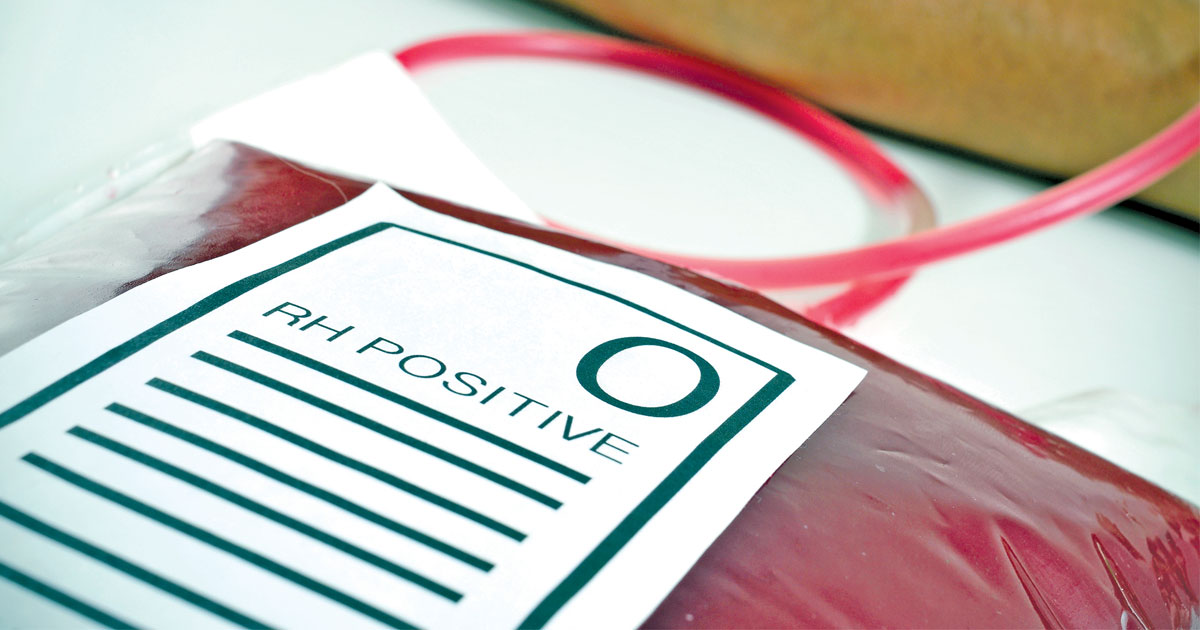Have you ever wondered what is meant by the term, “blood types”? Not all blood is the same, and understanding human blood types hinges on one key word: antigen. Antigens are markers on the surface of red blood cells. The antigens on your red blood cells determine what type of blood you have. The four main blood types are defined by the presence or absence of two antigens, known as A and B, on the surface of the red cells:
- If you have type A blood, only the A antigen is present on your red blood cells.
- If you have type B, only the B antigen is present.
- If your blood type is AB, both the A and the B antigen are present.
- If your blood type is O, neither the A nor the B antigen is on the surface of your red cells.
No one should ever be given blood that contains antigens that differ from the ones on their own red cells. This is because the body’s immune system is always on the lookout for foreign antigens. If it finds them, it sends out antibodies to attack and destroy them. This is the reason blood type matters when someone needs a transfusion. If they were to be given blood that contains foreign antigens, their immune system would attack them, with potentially disastrous results.
Antigens are not only present on red blood cells, but also on skin and hair cells, saliva, and semen. This is why ABO typing is often performed on the biospecimens found at crime scenes.
In addition to antigens, there is one more factor that plays a role in blood type. It is a protein called the Rh factor. Rh can either be present or absent in blood. If it is present, you are “Rh positive (+).” If it is not present, you are “Rh negative (-).” The presence or absence of the A and B antigens and the Rh factor determine the 8 most common human blood types (A+, A-, B+, B-, O+, O-, AB+, AB-).
Type O is Special
The most common blood type is type O. According to the American Red Cross, about 45% of Caucasians, 51% of African-Americans, and 57% of Hispanics are type O.Since O is the blood type most people have, type O donors are always needed, as their blood is most often required for transfusions. (In case you are wondering, AB is the least common blood type. Less than 10% of the population has type AB blood, which makes people with this rarer blood type very much needed as donors, too.)
O-negative blood is extra-special because it is far less common than O-positive blood. While about 1 in 3 people have O-positive blood, only about 6.6% of the U.S. population has O-negative blood. If you are one of these people, you are a “universal donor.” This means anyone with any blood type can be transfused with your O-negative blood. Ideally, of course, everyone should receive their own exact type of blood, but in an emergency, type O-negative can be given to anyone who needs blood. This is because O-negative blood has no A or B antigens or Rh protein on its cell surfaces, so there is nothing there that another person’s immune system can reject. Many trauma victims have survived only because there was O-negative blood on a medical helicopter or in an ambulance. O-negative blood is also the safest blood for newborns that enter this world with under-developed immune systems. Interestingly, while anyone can receive blood from an O-negative donor, those who are O-negative can only receive O-negative blood, since it has no antigens.
What You May Not Know About Type O
Clearly, people with O-negative blood have a special opportunity to save lives by donating “the gift of life”¾their blood. But there is one more reason type O blood is special. If you are blessed with type O blood, what you may not know is that your blood benefits you in special ways, too. Having type O blood gives you at least five health advantages that those with other blood types don’t have:
- You are less likely to have heart disease.
- Your chances for developing dementia are lower.
- Your risk for venous thromboembolism (VTE), a blood clot that starts in a vein, is lower.
- You have greater protection against pancreatic cancer.
- You have more stomach acid than others, so you can digest proteins and fats easier than those with other blood types.
Got O? That’s pretty awesome!
Sources: Blood Groups and Red Cell Antigens, ncbi.nlm.nih.gov; ABO Research in the Modern Era of Genomics Transfusion Medicine Reviews, Vol 26, No 2 (April), 2012: pp 103-118; The prognostic value of ABO blood group in cancer patients, Blood Transfus. 2016 Sep; 14(5): 434–440; Blood Type Matters for Brain Health, Scientific American Mind, January 1, 2015; Web MD Blood Type Quiz, webmd.com.



















